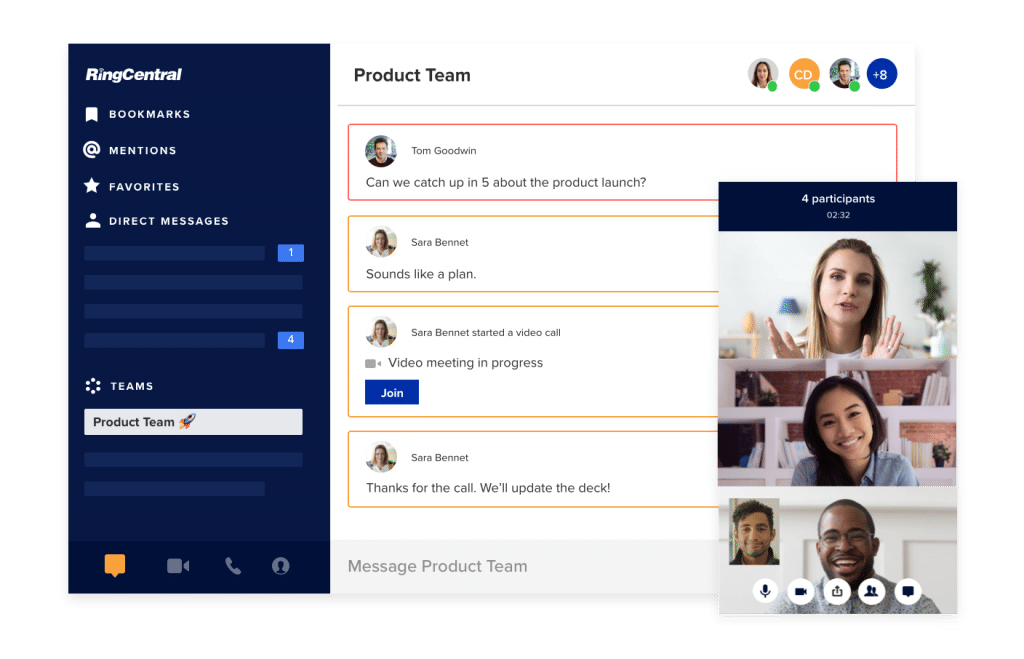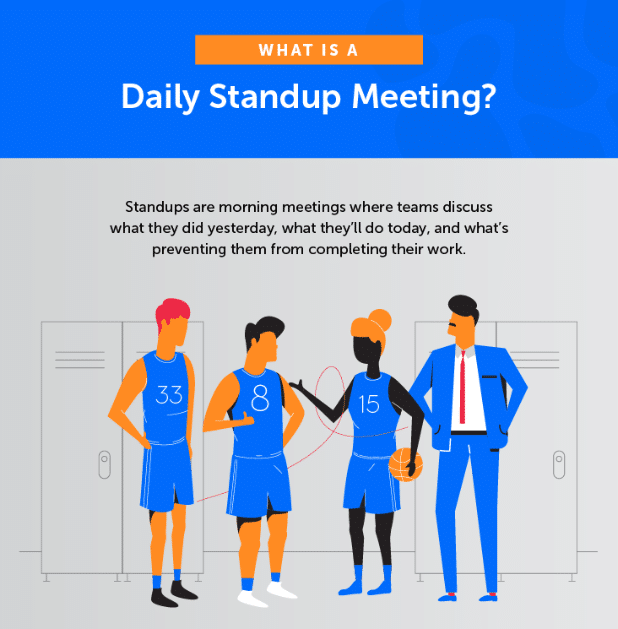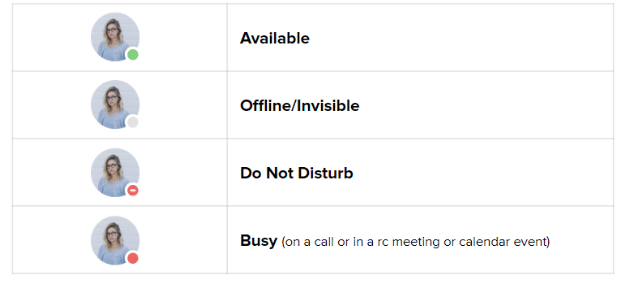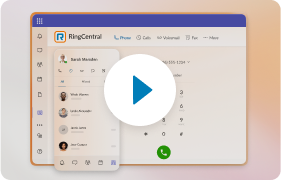We all (well, most of us) want to be part of a “dream team” at work, don’t we?
Whether it’s the Jordan-era Chicago Bulls or reigning Spanish soccer giants FC Barcelona, there’s a lot that the average business can learn from the success stories of the best sports teams in the world.

Here’s the thing, though: top-tier teamwork doesn’t happen by accident. It doesn’t mean relying on a single superstar like Michael Jordan or Leo Messi on your team, either.
So much of working together as a team comes down to the individual characteristics of your players (or in this case, your colleagues and coworkers).
In this guide, we’ll highlight:
- Why teamwork matters
- 10 traits that make for effective team players
- How to tell if you’re hiring a good teammate
- Bonus tips for training your next all-star team player
🔑 Spoiler alert: a powerful communication tool is one key to better team collaboration. Grab the free checklist to help you choose the right one for your business.
Why working together as a team matters so much
Effective teamwork goes hand in hand with higher productivity and a greater sense of loyalty among your workers.
In short, teams that work well together produce better work.
Not only that, but nobody can really afford to be an island in the modern workplace. Given that 50% of employees work remotely in some capacity today, the need for team players is only going to grow as the need for teamwork continues to evolve and collaboration hubs become more popular.
The 10 traits that everyone on a “dream team” should have
So, what should you look for in your star players? Whether you’re trying to tune up your current squad or are looking to bring on some fresh talent, here are our top 10 characteristics of effective teams.
1. A willingness to communicate
When it comes to working as a team, communication is a top priority.
And while sports teams eventually develop that psychic “sixth sense” of when they pass or shoot the ball, the ability to read your coworkers’ minds and know what they want before they want means frequently talking to each other.
Beyond in-face meetings or calls, the ability to be “on” and available to fellow teammates is a game changer. That’s why it’s so crucial to have communications tools that let you collaborate at a moment’s notice (across multiple platforms). Like RingCentral, for instance.

Whether it’s a full-blown video call with the entire team or a split-second check-in, you and your teammates don’t second-guess when work needs to get done.
2. A strong sense of accountability
Sports teams are only as good as the sum of their parts.
Let’s say someone isn’t pulling their weight during training and the team’s performance suffers as a result. Or on the flip side, a struggling player manages to overcome a scoring drought and leads their team to victory.
In both cases, teams need to have a pulse on what’s going on and what everyone is doing to improve the team as a whole. The same rings true for workforce management in the office.
For example, an individual employee should be able to clearly define how they’re contributing to the team at any given time. Which explains the popularity of daily stand-up meetings (either in-person or virtual) to highlight tasks and to-do lists:

These sorts of meetings help hold individuals accountable for their wins and struggles alike. Holding them daily also ensures that team members stay focused and don’t lose sight of what they need to be doing.
3. An understanding of their role(s) and strengths
A goalkeeper keeps the ball out of the net. A striker scores goals.
Just as sports teams have individual roles and responsibilities, so does your typical team.
Marketing manager. Sales associate. The list goes on and on.
And likewise, there are individual strengths and personality traits that speak to the strengths of people in those roles.
For example, you might have team members at your contact center who are totally comfortable on the phone with customers while others are mortified by calls. To flip things around, you might have someone who’s comfortable putting together a report versus someone who loathes dealing with documents.
Fact: When companies that allow their employees to focus on their strengths, they see increased engagement and higher productivity.
Translation? First and foremost, team members should be empowered to do the work that they’re good at and excel at.
4. The ability to work independently
This might seem like a no-brainer, but sports teams aren’t “together” 24/7.
Even on the training ground, individual players focus on drills and tasks specific to their positions and roles.
And hey, that’s a good thing!

For starters, nobody wants to be micromanaged. Consider also that some team members might have a desire to do deep work or block off time to focus on an individual task. Teams and managers should totally be respectful of this.
You can actually change up your status in RingCentral to highlight your availability to coworkers in situations where you need to focus on a specific task without interruptions.

5. A drive to reach goals and see results
Sports teams obviously want to win games (duh).
But what does a “win” look like to a business team?
Maybe that means crushing a quota. Perhaps it means successfully launching a product.
Either way, maintaining accountability means having an understanding of team-based goals and KPIs (think: sales, traffic, and so on). Beyond individual accountability, as noted earlier, knowledge of what teams are doing well (or struggling with) is key to getting better as a group.
6. The desire to constantly improve
Pop quiz: Do you think the United States women’s soccer team is satisfied with just four World Cup titles?
Of course not! They’re always going to strive for that next one.

Strong team players don’t accept mediocrity, nor do they rest on their laurels. Note that workers are heavily motivated by career mobility and the desire to move upward.
Whether it’s a leadership position within a team or a desire to push everyone around them to do better, everyone wins when you work with a go-getter.
7. A willingness to share
Messi might be able to score 50 goals in a single season, but not without his teammates selflessly setting up opportunities and providing assists.
On that note, team players at work should be more than willing to help out their coworkers. From sharing resources to insights and advice, being forthcoming and transparent when it comes to collaboration is always a plus.

8. The ability to resolve conflict
It’s no secret that toxic employees are a drag on workplace morale and productivity. (Speaking of which, here are a few productivity tips.)
That’s why it’s so important for teams at work to keep any animosity and negativity from lingering. This again speaks to the importance of frequent, honest communication between employees.
Fostering an empathetic, collaborative culture can nip a lot of conflict in the bud. How teammates ultimately resolve conflicts is up to them, but preventing conflicts in the first place just by being honest and open is ideal.
9. The confidence to make decisions
In short, members of your team should be proactive.
Although some decisions certainly require team-wide approval, having the judgment to “take shots” and move things forward is a plus:

Yet again, this is why the ability to communicate and ask questions around-the-clock matters.
Rather than force a coworker to be frozen with a specific task, they should be able to ask questions to either get the answers they need or move on to something else.
10. They’re willing to work alongside other teams
Much like how sports teams work together and coexist to make their respective leagues possible, the same logic holds for workplace teams contributing to a company as a whole.
From marketing and sales to HR and beyond, collaboration between teams is an expectation for today’s workforce. Although it’s definitely a priority for your team members to work as a unit, that unit also should ideally be on good terms with the rest of your company.
How to tell if you’re hiring a team player
Let’s say you’re on the hunt for a superstar to join your team.
In a one-on-one interview setting, it can be tough to understand someone’s sense of teamwork. That said, there are still some specific questions you can ask a potential hire such as:
- What’s your experience using workplace collaboration tools? (Ex: video conferencing software like RingCentral Video, project management tools like Trello, or collaborative documents via Google Docs)
- What are some examples of how you’ve worked as part of a team to solve a problem at work?
- What’s your definition of “trust” in the workplace, and what’s your definition of what a good “team player” is?
Based on their responses, you can get a sense of how they’ve collaborated with coworkers in the past and whether or not they’d be a good cultural fit with your current team.
Bonus tips for training your next all-star
Bringing someone new onto your team is exciting.
That said, you obviously want to maintain your current squad dynamic in the process.
Note that creating a sense of friendship and camaraderie is a crucial part of onboarding a new employee. Although learning your business procedures and practices is important, so is making sure your new hire feels welcome and part of a unit.
Fostering a supportive culture matters. Through team-building activities and working one-on-one with a new employee, you can make them actually feel welcome and integral to your workplace.
Ready to put together your dream team?
By focusing on the characteristics above, you can start building teams that can work seamlessly together to reach your company’s goals. Coupled with tools like RingCentral, those same workers have the ability to communicate and collaborate around-the-clock to do exactly that.
Updated Jul 14, 2025












